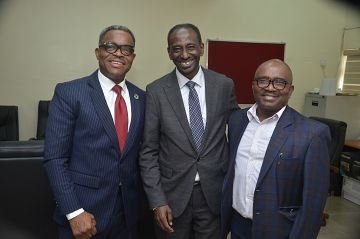Nigeria welcomes Malaria Consortium’s Chief Executive on collective efforts for national health sector resilience
27 November 2023 From left to right: Dr Chukwuma Anyaike, Director Public Health, Federal Ministry of Health, James Tibenderana, Chief Executive, Malaria Consortium, Dr Godwin Ntadom, National Coordinator, National Malaria Elimination Programme
From left to right: Dr Chukwuma Anyaike, Director Public Health, Federal Ministry of Health, James Tibenderana, Chief Executive, Malaria Consortium, Dr Godwin Ntadom, National Coordinator, National Malaria Elimination ProgrammeIn a visit of Nigeria, from 6th to 10th November, Dr James Tibenderana, Malaria Consortium’s Chief Executive, met with officials from the Federal Ministry of Health and representatives from national and international partners and stakeholders to explore the interventions, innovations, policy developments and financing required for resilience and health sector effectiveness in the pathway to malaria elimination. It was his first visit to Nigeria as Chief Executive since taking up the role in November 2022.
Welcoming the Malaria Consortium team on behalf of the Honourable Coordinating Minister of Health and Social Welfare, Professor Muhammad Ali Pate, the Permanent Secretary, Daju Kachollom, thanked Malaria Consortium for their efforts over the years to strengthen the health system, acknowledging the impact and sustainability of Malaria Consortium programmes and its continued support for the Government’s renewed approach.
Dr James Tibenderana, Malaria Consortium’s Chief Executive, commented, “In Nigeria, thanks to huge investments to ensure effective tools to prevent and treat malaria are accessible to many more people, the prevalence of the disease has dropped in the last 15 years from 42 percent to now stand at around 22 percent. However, malaria is still a leading cause of illness and death, especially in children under five and pregnant women, the progress previously seen has stalled and funding has plateaued. We need to consider what is needed to get back on track otherwise the goal of a malaria free world is not achievable.
With partnerships, with governments in the lead, everything is possible. We must ensure that the ‘next generation’ of tools, nets, vaccines, are deployed to the right places and importantly, deployed into a resilient health system that’s built around national priorities. It has been heartening to hear the vision of the Ministry of Health who are mapping how to ensure health outcomes are achieved and domestic financing is increased.”

Permanent Secretary, Federal Ministry of Heath, Nigeria Mrs Daju S Kachollom in a handshake with Dr James Tibenderana
Operating in global health for 20 years, Malaria Consortium recognised early in its evolution that addressing the burden of malaria also provided an opportunity to tackle other common conditions like diarrhoea, pneumonia and malnutrition, affecting the health of people living in communities across the countries in which it worked. Establishing a presence in Nigeria in 2008, the organisation with its development partners has mobilised over US$250 million to support health programmes, research, capacity development, technical assistance and procurement of commodities. In 2015, Malaria and Public Health Nigeria (MPH-N) registered as a national non-profit organisation and its activities currently cover 16 states with over 850 staff nationwide.
Generating evidence through implementation experience and robust research, Malaria Consortium is taking a whole-systems approach to tackling communicable diseases that builds capacity and resilience into health systems for the long term, alongside the delivery of mass campaigns of insecticide-treated bed nets and seasonal malaria chemoprevention. Seeking out collaborative partnerships, Malaria Consortium has been working with the private sector to improve the market supply chain of commodities that support the delivery of universal health coverage.
As part of the working visit to Nigeria, Dr Tibenderana and the Nigerian team met with long-standing partners, including officials from the National Malaria Elimination Programme, the World Health Organization, the Bill and Melinda Gates Foundation and the UK Government’s Foreign and Commonwealth Development Office to discuss continued collaboration. Collective commitment from global partners will be imperative in supporting national governments achieve an integrated approach that maximises funding and expertise to improve the health outcomes of their populations.
Related content
Our projects (Nigeria)
Nigeria
7 August 2023Child survival: African governments must show leadership
10 March 2023Innovative health financing: How to make good on the promises of Africa's new Public Health Order
Latest news
- Malaria Consortium honoured by Ugandan government for contribution to combat malaria23rd April 2024
- International summit calls for AMR accountability in public health interventions21st March 2024
- Global SMC community celebrates new milestone at SMC Alliance Annual Meeting in Nigeria6th March 2024
- Scaling up key interventions could halve pneumonia-related childhood mortality13th February 2024
- Malaria Consortium and eGov Foundation join Mozambique’s national malaria programme to digitalise seasonal malaria chemoprevention campaigns8th February 2024
- World’s first malaria vaccine rollout launched in Cameroon22nd January 2024